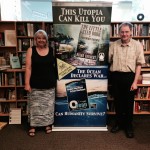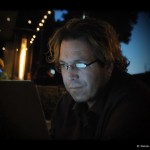A guest post by Lisa Mangum.
Well, hello there, Past Lisa. I see you are just sitting down to your laptop, an exciting new book idea all fresh and bubbly in your head. You haven’t decided what to call it yet; for now, it’s just “my story”—as in “I can’t make dinner tonight, sweetie, I have to work on my story.” You don’t know it, but this idea will be your first published book, The Hourglass Door. It’s good the story is about time travel, because you see, this is Future Lisa, and I have come from, well, the future to share with you some advice about writing and publishing and the journey that awaits you.
1. You’re going to love it.
Trust me on this one. There is a lot to love about writing. Developing an idea is freedom. You get to do whatever you want and no one can stop you—not the plot, not the characters, not your readers, friends, family, or even the voice in the back of your head that warns of failure. You get to ask “Wouldn’t it be cool if…?” all the time, and there are no wrong answers to slow you down.
The writing process itself is even better. It’s like a huge, scattered jigsaw puzzle, and you get to sift and sort through the words, ideas, and images until you find two that fit together so perfectly you just know it was meant to be. And you simply connect more words and ideas and images until you have a whole big beautiful piece of art to share with everyone.
You’re going to love seeing your words come alive on the computer screen. You’re going to love making them stronger and better. And you’re going to love it when other people read them and say, “This is great!”
Most of all, you’re going to love seeing those words between the pages of a real book cover. And yes, that will be your name there on the front. You will never forget the first time you hold your very own published book in your hands.
Savor those moments. Love them. Remember them. Hold on to them tightly, because as much as you’re going to love it…
2. You’re going to hate it.
Editing sucks. Rewrites are ugly. Bad reviews hurt. Figuring out how to sell your book in one sentence is excruciating. Standing for hours on a Saturday afternoon in Costco trying to talk strangers into buying your book when all they really want to do is buy a five-pound jug of mayonnaise and go home is no fun. Sitting at a bookstore on a cold February night with only one copy of your book in the entire store, but you can’t sell it because no one even comes into the store for two hours—unspeakable.
(Later, you may find these to be valuable learning experiences, but at the time…yeah, you’re going to hate them.)
Deadlines are impossible, terrifying, unrelenting beasts. You will find yourself saying “no” to all kinds of things: No, I can’t go to the movies with you; I have to work on my book. No, I can’t read that new novel; I have to work on my book. No, I can’t be bothered to shower, eat, sleep, change my clothes, speak nicely to another human being; I have to work on my book. Your life will be measured in increasing word counts and decreasing days until the deadline knocks you flat.
But it doesn’t matter, really, because the deadline is just the point where your editor will say, “That’s great. Now rewrite the whole thing and make it better. And can you have it done by next month?”
3. The answer is “Yes.”
Remember to balance out all those “No” answers with some “Yes” answers as well.
You will be asked a lot of questions during your journey as a writer. And more often than not, the best answer to give is “Yes.” I know you won’t have much time for marketing your book. (You’ll still need to work full-time while you write, after all.) But if you say “yes” to one marketing event per week, you’ll be surprised at how many wonderful things you’ll experience and how many wonderful people you’ll meet.
So say yes to those book signings, blog interviews, newspaper articles, TV appearances, speaking requests for book clubs, business conferences, and writing conferences.
And above all, say yes when it comes time to celebrate your achievements: “You’ve just finished your last book. Do you want to go to Disneyland to celebrate?” YES.
4. Dream bigger.
You know how everyone tells you to “dream big”? Well, I want to tell you to dream bigger. Whatever you think your ultimate goal is, whatever the pinnacle of your personal and professional success looks like—dream bigger.
You hope in your secret heart to sell 1,000 copies of your book? Dream of selling 5,000. You think it would be amazing to win an award for something you wrote? Dream of winning four awards. You feel pretty sure you’ll be happy if you write only one book? Well, surprise—you have more stories in you than you’ll know what to do with. Make sure your dreams grow every bigger day.
5. “Don’t hurry. Don’t worry. Don’t stop.”
Remember when you saw this quote at Disneyland? The truth of it will become more important to you every day that passes. No matter what happens, don’t hurry through the good stuff, don’t worry about the bad stuff, and just don’t ever stop.
(So, now that I’ve been-there-done-that, where do I pick up my T-shirt?)
 Guest Writer Bio: Lisa Mangum attended the University of Utah, graduating with honors with a degree in English. A lifetime lover of books, she has worked in the publishing industry since 1997, editing works by several New York Times bestselling authors as well as debut novelists. She was recently named Managing Editor of Shadow Mountain Publishing.
Guest Writer Bio: Lisa Mangum attended the University of Utah, graduating with honors with a degree in English. A lifetime lover of books, she has worked in the publishing industry since 1997, editing works by several New York Times bestselling authors as well as debut novelists. She was recently named Managing Editor of Shadow Mountain Publishing.
Besides books, Lisa loves movies, sunsets, spending time with her family, and trips to Disneyland. She lives in Utah with her husband, Tracy. She is the author of four award-winning YA novels (The Hourglass Door trilogy and After Hello), a short story (“Sold Out”), and novella (“&”). She also edited One Horn to Rule Them All: A Purple Unicorn Anthology.
You can find her @LisaMangum or Facebook.com/lisamangum.


